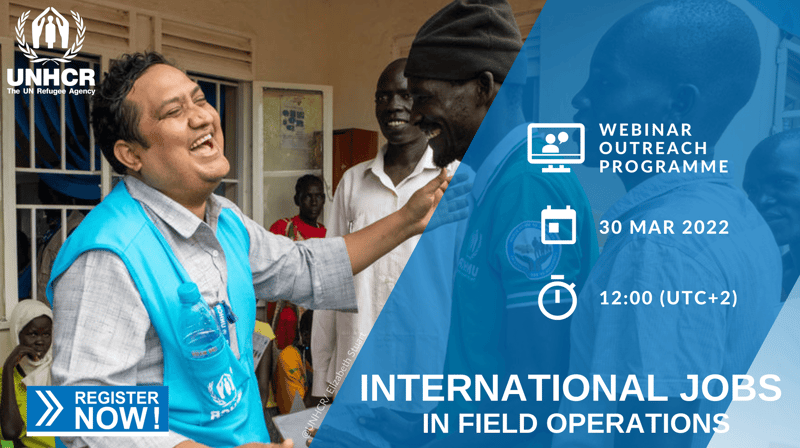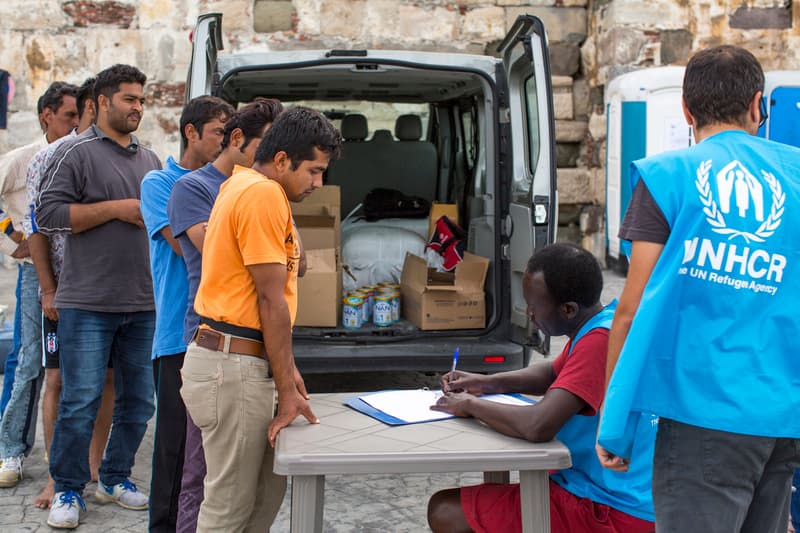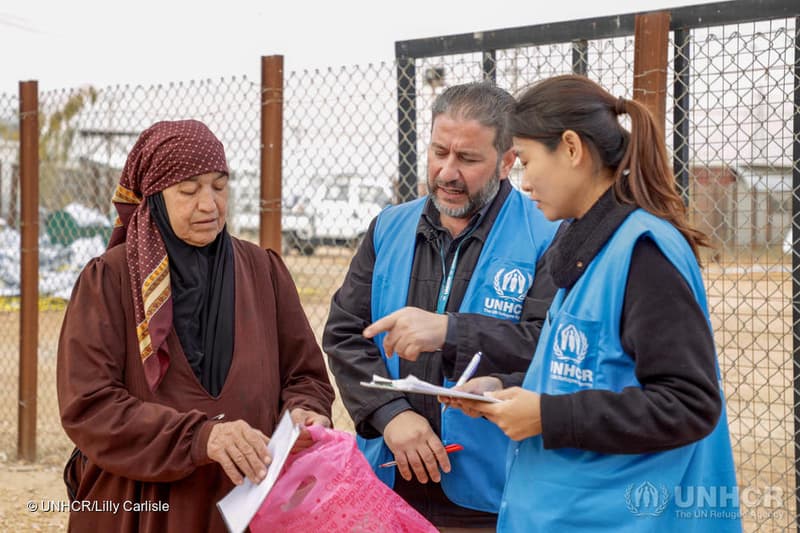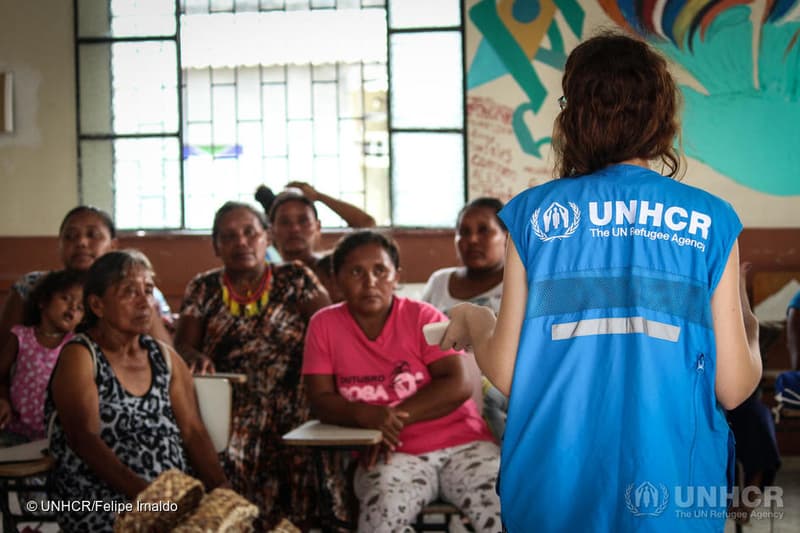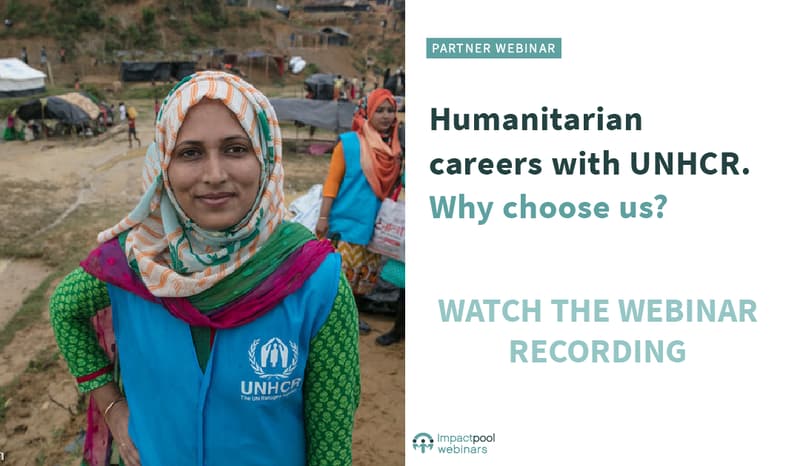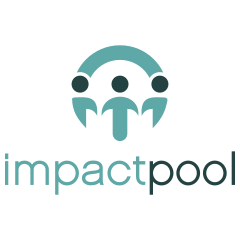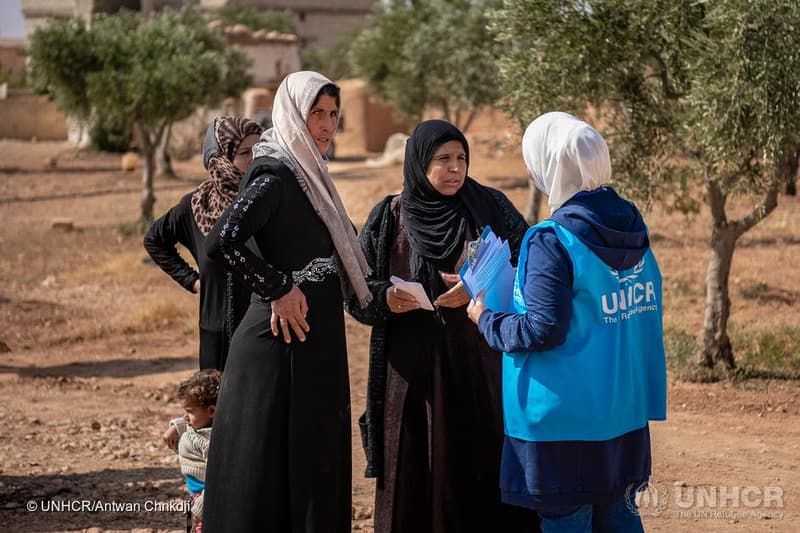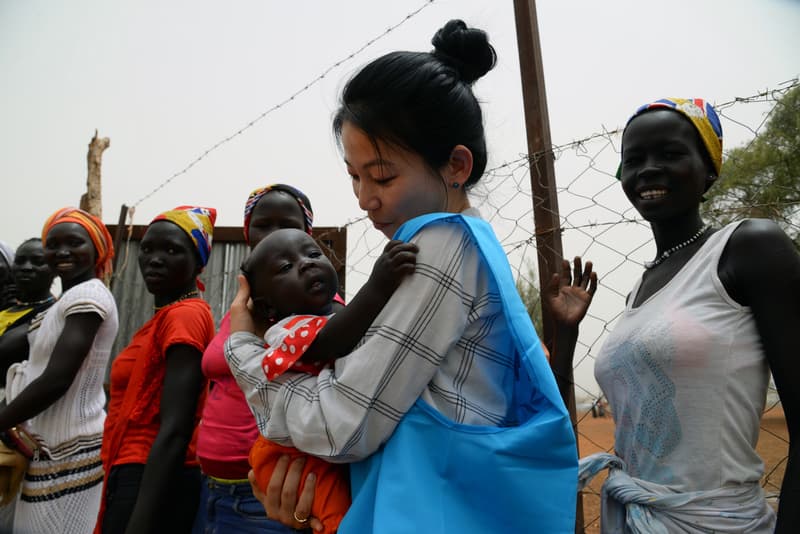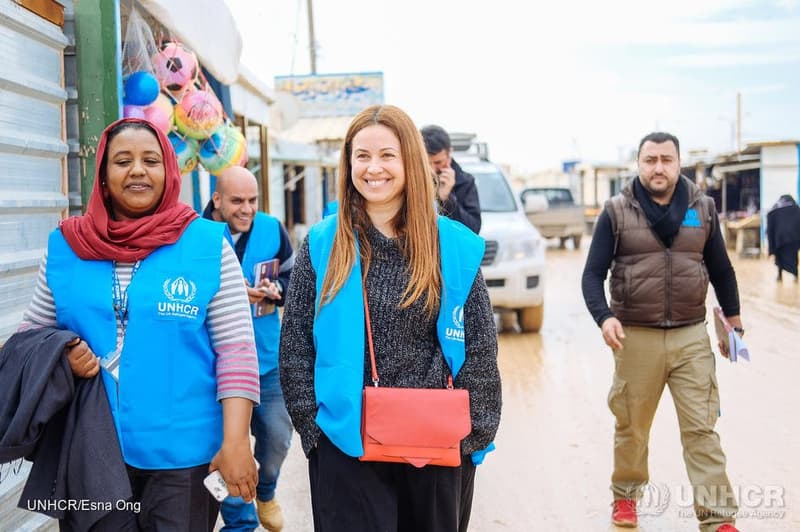Assistant WASH Officer(N)
Addis Ababa
- Organization: UNHCR - United Nations High Commissioner for Refugees
- Location: Addis Ababa
- Grade: Administrative support - Administrative Services and Support - Generally no need for Higher Education
-
Occupational Groups:
- Administrative support
- Water, sanitation and hygiene (WASH)
- Closing Date:
Hardship Level
Family Type
Family Type
Residential location (if applicable)
Grade
Staff Member / Affiliate Type
Reason
Fast Track > Fast TrackRemote work accepted
Target Start Date
Job Posting End Date
Standard Job Description
Assistant WASH Officer
Organizational Setting and Work Relationships
The Assistant WASH Officer assists in the provision of professional technical support and guidance on activities within the areas of Water, Sanitation & Hygiene (WASH) in the locations within the Areas of Responsibility (AoR). The incumbent normally reports to the WASH Officer. S/he coordinates interventions with UNHCR's implementing partners in line with WASH Sector. In addition, the incumbent will be expected to work within multi-functional and interdisciplinary teams.
The Assistant WASH Officer will support UNHCR, in coordination with the Government, to assess needs and coordinate the provision of WASH, and in particular, hygiene promotion services to Persons of Concern (PoC) to UNHCR. This will include coordination at site level with WASH partners in conjunction with the government authorities, and monitoring progress of hygiene promotion programme implementation to ensure that an adequate level of hygiene promotion service is provided at each site in accordance with the UNHCR WASH Manual and Technical Guidelines, and applicable UNHCR Standards and/or National Standards.
S/he will follow a rights-based and community focused approach to programme design and implementation. The incumbent will follow the five principles for protection, accountability and WASH as outlined in UNHCR's WASH Manual.
Where there is no senior WASH colleague in operation or the region, the incumbent should maintain regular communication with the WASH team in HQ for technical advice, information, and access to updated global tools and resources.
In order to ensure wider reach out to the refugees and other persons of concern and ensure their close involvement in the delivery and management of the Water, Sanitation & Hygiene (WASH) services, if not already in place, the incumbent will need to establish an appropriate consultative and monitoring framework which would draw the experience and expertise of a wide range of actors both internally and externally.
All UNHCR staff members are accountable to perform their duties as reflected in their job description. They do so within their delegated authorities, in line with the regulatory framework of UNHCR which includes the UN Charter, UN Staff Regulations and Rules, UNHCR Policies and Administrative Instructions as well as relevant accountability frameworks. In addition, staff members are required to discharge their responsibilities in a manner consistent with the core, functional, cross-functional and managerial competencies and UNHCR's core values of professionalism, integrity and respect for diversity.
Duties
Leadership and Coordination
- Work to coordinate activities of WASH implementing partners, together with other UN agencies, governmental and non-governmental organisations (NGOs) and other partners within the AoR to ensure delivery of WASH services to beneficiaries (PoC and host community) meets UNHCR and /or nationally recognised and most up-to-date standards and policies.
- Where there are PoC living outside of camps/settlements, work with partners to ensure the enjoyment of the human right to water and sanitation by all PoC.
- Work with senior WASH staff (or management) to engage government and partners, following the Global Compact on Refugees (GCR), to unlock resources (humanitarian and development) for the design and construction of community-centred infrastructure, improved hygiene conditions, safe management of water and sanitation services and service provision upgrades in refugee hosting areas.
- Work towards ensuring that all decision making regarding WASH services takes in to account the needs and capacities of PoC, and the solutions proposed by PoC.
- Facilitate WASH coordination among partners, ensuring that inclusive and good practice coordination structures for all technical sectors covered are in place.
- Assess gaps and overlaps in UNHCR funded WASH programmes and unmet needs, work to ensure that they are addressed, and the activities are oriented to addressing priority WASH issues.
- Provide support to a multi-sector "technical unit" in the AoR, including sector functions covering site planning, shelter, health, nutrition, and environment.
- Where relevant, provide support to national government(s) for inclusion of PoC within national SDG 6 development plans (Urban and Rural) and financing mechanisms and service delivery systems.
- Contribute to key WASH strategic partnerships with development and humanitarian agencies to support inclusion of refugee WASH services within national systems and development financing mechanisms.
- Engage with Urban WASH actors (GAUC, UCLG, UNHABITAT, Municipal Authorities, Utilities, and relevant government line ministries) for preparedness planning, inclusion in pro-poor tariffs, and provision of WASH services to PoC hosted in urban areas.
WASH Strategy, Planning and Programme Support
- Follow a WASH strategy which identifies the targets and approaches for water supply, excreta management, personal and environmental hygiene (including menstrual health), solid waste management, vector control, and institutional WASH facilities.
- Under guidance of senior WASH staff (or management) jointly with WASH partners and other stakeholders, update detailed needs and resource assessments and revise designs and technical plans, taking into account practical aspects of implementation, long-term sustainable solutions, and relevant technical specifications and guidelines.
- Advise and assist the UNHCR programme staff on the development of WASH aspects of the programme including planning, budgeting and input to financial management of the programme.
- Involce PoC during planning, design, implementation, and monitoring of WASH services using an age, gender and diversity approach.
- Work with senior WASH staff (or management) to ensure the WASH Strategy includes all UNHCR PoC, and considers at a minimum WASH access data collection, and advocacy for inclusion of all PoC (both in camp and out of camp) within national systems of WASH service provision
Technical Assistance and Capacity Building
- Plan and address adequately the needs of women, children, the elderly and people living with disabilities in planning and implementing WASH activities.
- Provide input to the Operation to define the scope of UNHCR involvement, expressed in terms of overall and operational objectives during emergency, transition, and protracted phases.
- Support the review and analysis of partner project proposals and budgetary submissions.
- Use community-based approaches, including clear involvement of women, girls, boys, and men, elderly, persons with disabilities in the design of WASH related infrastructure, products, and services.
- Provide technical assistance to UNHCR office(s) and programmes in the development, integration and mainstreaming of appropriate client-focused and cost effective WASH programmes.
- Ensure development of information, education and communication materials through community consultations, collaborating with women, girls, boys, men, elderly, persons with disability, and other potentially marginalised groups.
- Contribute to capacity strengthening activities of UNHCR and its implementing/operational partners to address key areas of WASH importance to PoC.
- Contribute to building the capacity and competence of UNHCR's staff on both hardware and software components of WASH
- Ensure community capacity building is carried out through multi-discipline teams working with women, girls, men, and boys of the community to train and empower them on WASH related aspects including: menstrual health, hygiene promotion, operation and maintenance, monitoring and reporting, and other topics.
Monitoring, Evaluation and Quality Assurance
- Monitor and evaluate WASH programmes within the AoR against standard UNHCR and SDG indicators to ensure that programmes are evidence-based and implemented in a comprehensive, client-focused, and cost effective manner.
- Contribute to carrying out monitoring and evaluation following UNHCR's WASH monitoring system using standard resources for data collection, analysis and interpretation
- Ensure that all data regarding the boreholes and WASH infrastructure is updated on UNHCR's GIS portal and relevant website(s).
- Monitor the collection and recording of SDG 6 WASH access data in the WASH Monitoring System for all UNHCR PoC to enable comparative reporting against national averages, to ensure that refugees/IDPs are not being "left behind".
- Collate WASH services access data (for both in-camp and out-of-camp PoC) to identify and promote inclusion of PoC within national SDG 6 development plans and financing mechanisms and service delivery systems.
Reporting and Accountability
- Work towards PoC¿s access to feedback and accountability mechanisms for the WASH services.
- Contribute to the collating and analysis of data on the satisfaction of PoC with regards to WASH services.
- Provide input to regular sectorial reports and submit material for preparation of periodic project monitoring reports as required.
- Report regularly on WASH activity implementation by all WASH partners, while maintaining accurate records of all relevant performance indicators.
- As requested, provide input to adequate reporting, timely updates and briefings to donor and management.
- Perform other related duties as required.
Minimum Qualifications
Education & Professional Work Experience
Years of Experience / Degree Level
For P1/NOA - 1 year relevant experience with Undergraduate degree; or no experience with Graduate degree; or no experience with Doctorate degree
Field(s) of Education
Agriculture, Civil Engineering, Environmental Sciences, Hydrology,
Geology, Natural Resources Management, Public Health, Rural Development,
Social Science, Project Management, Construction, Anthropology,
Urban Planning, Sociology, Community Development, Social Work,
Social Development, Architecture, Water Resources Development, Water/Sanitation Engineering
or other relevant field.
Certificates and/or Licenses
Not specified
Relevant Job Experience
Essential
Proven expertise in the area of WASH including surveys, programme implementation, monitoring and evaluation, and coordination.
Desirable
Knowledge and understanding of water and wastewater hydraulics and physical, chemical and biological properties; solid waste management practices, vector control and hygiene promotion/awareness raising strategies.
Knowledge and understanding of relationship between water, wastewater, solid waste, vector control to public health indicators, and value of hygiene promotion/awareness raising and behaviour change methodologies.
Functional Skills
IT-Computer Literacy
PR-Country Operations applying the Cluster Approach
IT-Geographic Information Systems (GIS)
PG-Programme Management (programme cycles and reporting standards)
CO-Reporting skills
UN-UN/UNHCR Mandate and Global Strategic Priorities
WA-WASH Assessment: Survey planning, implementation and oversight
WA-WASH-related Technologies
(Functional Skills marked with an asterisk* are essential)
Language Requirements
For International Professional and Field Service jobs: Knowledge of English and UN working language of the duty station if not English.
For National Professional jobs: Knowledge of English and UN working language of the duty station if not English and local language.
For General Service jobs: Knowledge of English and/or UN working language of the duty station if not English.
All UNHCR workforce members must individually and collectively, contribute towards a working environment where each person feels safe, and empowered to perform their duties. This includes by demonstrating no tolerance for sexual exploitation and abuse, harassment including sexual harassment, sexism, gender inequality, discrimination and abuse of power.
As individuals and as managers, all must be proactive in preventing and responding to inappropriate conduct, support ongoing dialogue on these matters and speaking up and seeking guidance and support from relevant UNHCR resources when these issues arise.
This is a Standard Job Description for all UNHCR jobs with this job title and grade level. The Operational Context may contain additional essential and/or desirable qualifications relating to the specific operation and/or position. Any such requirements are incorporated by reference in this Job Description and will be considered for the screening, shortlisting and selection of candidates.
Desired Candidate Profile
b) UNHCR field experiences especially WASH or engineering related fields.
c) Good command of English language both spoken and written. Knowledge of Somali culture and language is desirable.
d) Ability to work under limited supervision
Required languages (expected Overall ability is at least B2 level):
,
,
Desired languages
,
,
Operational context
Occupational Safety and Health Considerations:
Nature of Position:
Living and Working Conditions:
Further to the conflict in and around the Laascanood area of Somaliland state of Somalia (Sool region) of early 2023, an estimated 100,000 refugees crossed into the Doolo zone of the Somali Regional State of Ethiopia. In order to respond effectively, UNHCR set up a base in Bokh, a small town located in Doolo zone of the Somali Regional State of Ethiopia and headquarters of the Bokh woreda (district), with an estimated population of 50,000 people. Bokh is situated 170 kms from Wardher, the zonal capital of Doolo zone and some 80-100 kms from the Ethiopia-Somalia border. Bokh is also located at almost 700 Kms from Jijiga, the headquarters of the Somali Regional State Government where UNHCR Sub-Office is based.
Given the remoteness of the area and its proximity to the border with Somalia, the security situation in Bokh is considered to be fluid and requires a sense of vigilance and alertness. UNHCR’s Field security staff on ground in collaboration with UNDSS provides security advisories regularly to all staff in Bokh and the surrounding field locations to which adherence is expected. There are a few upcoming private real estate investments in Bokh. Provision of accommodation to national staff is not yet decided. Security briefing is mandatory upon arrival at the duty station. All travel itineraries should report to the radio room before departure and continue reporting their position every 60 minutes, until back to base. Official working hours are Monday through Thursday: 08:00 – 12:00 and 13:00 – 17:00 hours; while on Fridays 08:00 – 13:30 hours.
Bokh is served by a Government Health Centre and a Level-1 Hospital in Wardher, both of which offering basic medical services. It should be emphasized that the medical facilities in the area are insufficient to treat complicated medical cases. The UN Team in Bokh is working on a plan to establish a UN Clinic with a full-time doctor and nurse to provide onsite medical assistance to staff and also process referrals as may be needed. A medevac plan is also under discussion in collaboration with the Medical Services Team at the Regional Bureau in Nairobi and the UN Health Care Centre in Addis Ababa; the latter provides 24/7 health care services for eligible UN staff and their dependents in different specialized Medical Units. Bokh also has small markets, restaurants and shops from where food and other household items can be purchased. Banking services are very limited in Bokh and it always advisable to carry cash. The only Ethiopian Commercial Bank branch is located 170 kms away in Wardher where financial services, including ATM machines, can easily be accessed. However, a microfinance agent exists in Bokh and facilitates some small financial transactions in the local currency.
Transportation in and out of Bokh is by road. However, the UN Team is mobilizing donors to facilitate the establishment of an airstrip in Bokh so that UNHAS can operate regular flights to Addis Ababa. Land for the airstrip has already been provided by the authorities and technical surveys undertaken by UNHAS. In the meantime, travel is either through Jijiga (served by Ethiopian Airlines daily) or through Kebridehar where Ethiopian Airlines flies from Addis Ababa twice a week, and then onward on a road journey of some 7 hours on a dusty road.
Network coverage is unreliable in Bokh. In commercial hotel accommodations, there is no access to the internet at all. Connection to wireless networks and other ICT needs is under preparation by UNHCR ICT colleagues. VSAT equipment are being prepared for installation in Bokh and some ICT emergency kits have recently been delivered in Bokh to facilitate staff office activities.
Additional Qualifications
Skills
CO-Reporting skills, IT-Computer Literacy, IT-Geographic Information Systems (GIS), PG-Programme Management (programme cycles and reporting standards), PR-Country Operations applying the Cluster Approach, UN-UN/UNHCR Mandate and Global Strategic Priorities, WA-WASH Assessment: Survey planning, implementation and oversight, WA-WASH-related TechnologiesEducation
Certifications
Work Experience
Competencies
Accountability, Client & results orientation, Commitment to continuous learning, Communication, Empowering & building trust, Innovation & creativity, Judgement & decision making, Organizational awareness, Planning & organizing, Teamwork & collaboration, Technological awarenessUNHCR Salary Calculator
https://icsc.un.org/Home/SalaryScales
Compendium
Additional Information
Female candidates are encouraged to apply.Functional clearance

